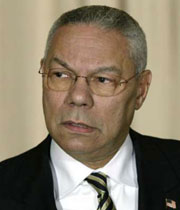|
 |
| U.S. Secretary of
State Colin Powell addresses ECA reception for Humphrey Fellows and Foreign
Diplomats in the Benjamin Franklin Room, at the State Department in
Washington, November 15,
2004. (Reuters) |
Secretary of State Colin L. Powell announced his resignation yesterday,
ending four years of battles with Vice President Cheney and Defense
Secretary Donald H. Rumsfeld over the course of U.S. foreign policy.
Administration officials said Powell, whose
departure was announced by the White House along with three other Cabinet
resignations, will be replaced by national security adviser Condoleezza
Rice, one of President Bush's most trusted confidants
. Rice will be replaced by her deputy,
Stephen J. Hadley, administration officials said. The Rice and Hadley
announcements will be made as soon as today, the officials said.
Republican officials said the selection of Rice reflects Bush's
determination to take personal control of the government in a second term,
especially departments and agencies that he felt had undermined him in the
first four years. Powell's departure is also a victory for conservatives,
removing the administration's most forceful advocate for negotiations and
multilateral engagement on such issues as Middle East peace and curbing
nuclear activities in Iran and North Korea.
A White House official said Powell indicated to the president weeks or
months before Nov. 2 that he planned to leave soon after the election. But
one government official with personal knowledge of the situation said
Powell had second thoughts and had prepared a list of conditions under
which he would be willing to stay. They included greater engagement with
Iran and a harder line with Israeli Prime Minister Ariel Sharon.
Powell and Bush met at the White House on Friday, the date on the
secretary's letter of resignation. Details of the meeting could not be
learned, but White House officials said the secretary was not asked to
stay. A senior State Department official said Powell made no demands of
the president and gave no hints that he might stay, an account echoed by
White House aides.
Bush issued a statement yesterday calling Powell "one of the great
public servants of our time" and praising "the calm judgment and steady
resolve he has brought to our foreign policy."
In an appearance yesterday afternoon in the State Department briefing
room, Powell said he will stay "a number of weeks or a month or two, as my
replacement goes through the confirmation process." He described his
departure as long in the making.
"In recent weeks and months, President Bush and I
have talked about foreign policy and we've talked about what to do at the
end of the first term," Powell said. "It has always been my intention that
I would serve one term. And after we had had a chance to have good and
fulsome
discussions on it, we came to the mutual agreement that it would be
appropriate for me to leave at this time."
Foreign policy experts predicted that Powell's resignation, and Rice's
ascension, could result in a more coherent message from the Bush
administration. Kenneth Adelman, a conservative foreign policy specialist,
worked with Powell during the Reagan administration. "Powell is a
wonderful, wonderful person," he said. "The sad part about this episode in
this Bush administration is fundamentally he and the president disagreed
on central issues on national security and foreign policy."
Rice, by contrast, "certainly shares Bush's views and has learned
better than anyone what Bush's views are," Adelman said. "You are not
going to have that split in a second term."
The White House announced Powell's departure along
with the resignations of three other Cabinet members -- Education
Secretary Roderick R. Paige, Agriculture Secretary Ann M. Veneman and
Energy Secretary Spencer Abraham. Their departures -- along with the
earlier resignations of Attorney General John D. Ashcroft and Commerce
Secretary Donald L. Evans, and the likely departure of Homeland Security Secretary Tom Ridge for a lucrative post in
private industry -- mean that Bush will replace about half of the
15 heads of executive departments for his second term.
White House press secretary Scott McClellan suggested that the
resignations were a mix of voluntary and involuntary. "The president has
the right to make decisions about who makes up his team for a second
term," he said.
Administration officials said Rumsfeld, the other
most prominent member of Bush's war cabinet, will continue to run the
Pentagon for the foreseeable
future.
(Agencies) | 